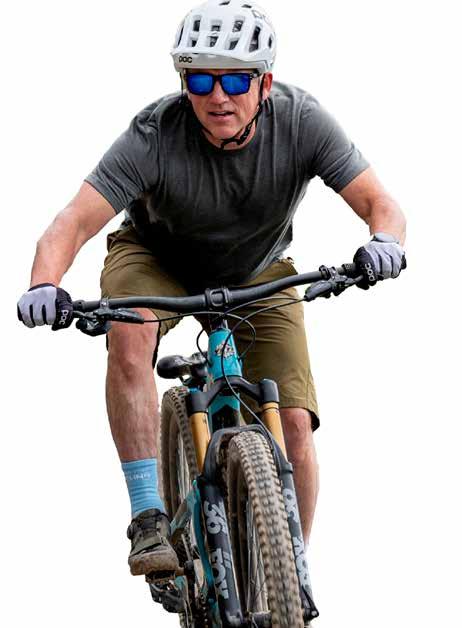
3 minute read
ASK THE EXPERT
Christopher Roseberry, MD, Trauma Medical Director at AVH, on the importance of safety equipment, preventive check-ups and a cautious approach when enjoying the Roaring Fork Valley from a bicycle seat.
How big a problem are bicycling injuries in the Aspen area? Aspen Valley Hospital’s emergency department treats 300 or more people each year for serious injuries suffered in bicycling accidents, and many more are treated at the Snowmass Clinic and After-Hours Medical Care in Basalt. To me, that’s a serious problem.
What special risks does this area pose for cyclists? Cyclists can get in trouble coming down from the Maroon Bells, Ashcroft or other windy, steep mountain roads. Problems can get gnarly very quickly if the roads are wet and riders come into curves too fast. Many people here are also on bikes that are unfamiliar to them, such as rental bikes. In that case, they should take a ride somewhere slow and easy before going out on a big ride. And remember: Heavier e-bikes take longer to stop, so brake early. How important are helmets? Bicycle helmets are of the utmost importance and should be worn at all times and on all types of bikes. Wearing one can turn a potentially major head injury into a minor head injury, and they can turn a potentially minor head injury into no injury. They don’t prevent all head injuries, but they make them less severe. In addition, a full-face helmet is recommended for mountain bikers on significant downhill rides. Facial injuries can be severe and expensive to treat, and it’s not uncommon to go face-first over the bike in an accident. What other safety equipment do you recommend for cyclists? Elbow and knee pads are also recommended for mountain bikers. If you’re taking the big jumps at Snowmass or elsewhere, a back protector is important. Many downhill mountain bike racers use them, as well as a cervical collar that prevents the head from hyperextending, which can cause spinal injuries. You’re a cycling enthusiast. What are some rules you keep in mind? I ride my bike almost daily, and I always check the tire pressure, brakes and gears before going out. In the rain, I ride slower than usual or just take the day off. Rain is the biggest condition that can affect your ride because it affects braking distance. That’s especially true with road bikes since the rim brakes on most road bikes are much less effective in wet conditions. When mountain biking, I ride with a buddy so I have help if something goes wrong. What are some safety tips people may not know about? Going head over handlebars while riding downhill happens because people sit forward and then, when they hit the brakes, it pops them over the handlebars. Shifting your weight back is a key tenet for going downhill on a mountain bike. Also, always look where you want to go. Don’t look at the ground or the side of the trail; those are places you don’t want to go. Look forward, and your bike will tend to go where you’re looking.
0401 CASTLE CREEK ROAD ASPEN, CO 81611 970.925.1120
PRSRT STD U.S. POSTAGE PAID
CURTIS 1000
COVID-19 VACCINES, TESTING, UPDATES AND RESOURCES
Aspen Valley Hospital continues to work with Pitkin County Public Health and other local agencies to provide up-to-date COVID-19 information, a Respiratory Evaluation Center on campus for testing and care, vaccine information and medical assistance.
One of the best ways to protect yourself and others is to get vaccinated. All individuals over the age of 12 are eligible for the Pfizer vaccine, and everyone over the age of 18 is eligible to receive the Moderna or Johnson & Johnson vaccine.
To get vaccinated, tested or for information, call 970.429.3363 or click on this button
And as always, please practice healthy habits to keep yourself and our community safe.

HEALTHY BEST PRACTICES
@AspenValleyHospital @AspenValleyHospital @AspenValleyHospital
AspenHospital.org printed on recycled paper








